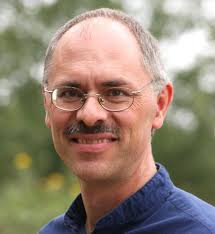 Andre Gingerich Stoner is director of Holistic Witness for Mennonite Church USA
Andre Gingerich Stoner is director of Holistic Witness for Mennonite Church USA
Several weeks ago, I attended the annual Exponential church planters’ convention. Those days brought together the holistic witness and interchurch parts of my work. The conference attracted several thousand people for several days of preaching, inspirational stories, and practical workshops. I found myself immersed in an evangelical world. About forty Mennonites met for lunch to network and compare notes.
The speakers on the main stage included inspiring stories of conversion and growth. Despite some critical words to the contrary, numbers and more numbers seemed to be the main markers of success.
At times I found it hard to connect.
Yet, when I wandered into seminars and workshops, I discovered a whole host of practitioners and thinkers who surprised, challenged and stretched me. They talked with critical awareness about the Christendom era; they challenged the consumerism of American culture; they talked about discipleship as a daily following of Jesus and connecting with the poor; they talked about living in neighborhoods and building relationships in ways that would make any MCCer proud.
There are interesting things happening below the surface and at the edges of the evangelical world.
Sometimes these things make it onto the main stage.
In that setting I also found myself nourished and challenged. The preaching and the stories were filled with the conviction and the experience that God’s love is powerful and active. What happened on the cross is regarded as a decisive event that changes lives and changes the world. The confession that Jesus is Lord is a radical pledge of allegiance. And people are practiced in sharing their experiences of transformation and faith with their neighbors and colleagues.
I left for home with new imagination for how God wants to use me in my family, my congregation and my neighborhood.
In thinking about my experiences at Exponential, an analogy from the natural world came to mind. An ecotone is the transition space between two biomes – the border, for example, between a forest and a wetland. An unusual number and variety of species are found in these areas of transition. New and unexpected adaptations develop here.
Many of us live pretty safely ensconced in our particular biome, whether that’s a progressive or traditional space, whether we are social justice-minded or evangelically oriented.
Interesting new insights, energy and pathways develop, however, in those places where these worlds rub up against each other.
I pray for this kind of exchange and cross-pollination, both in the broader body of Christ and within our own Mennonite fellowship.

